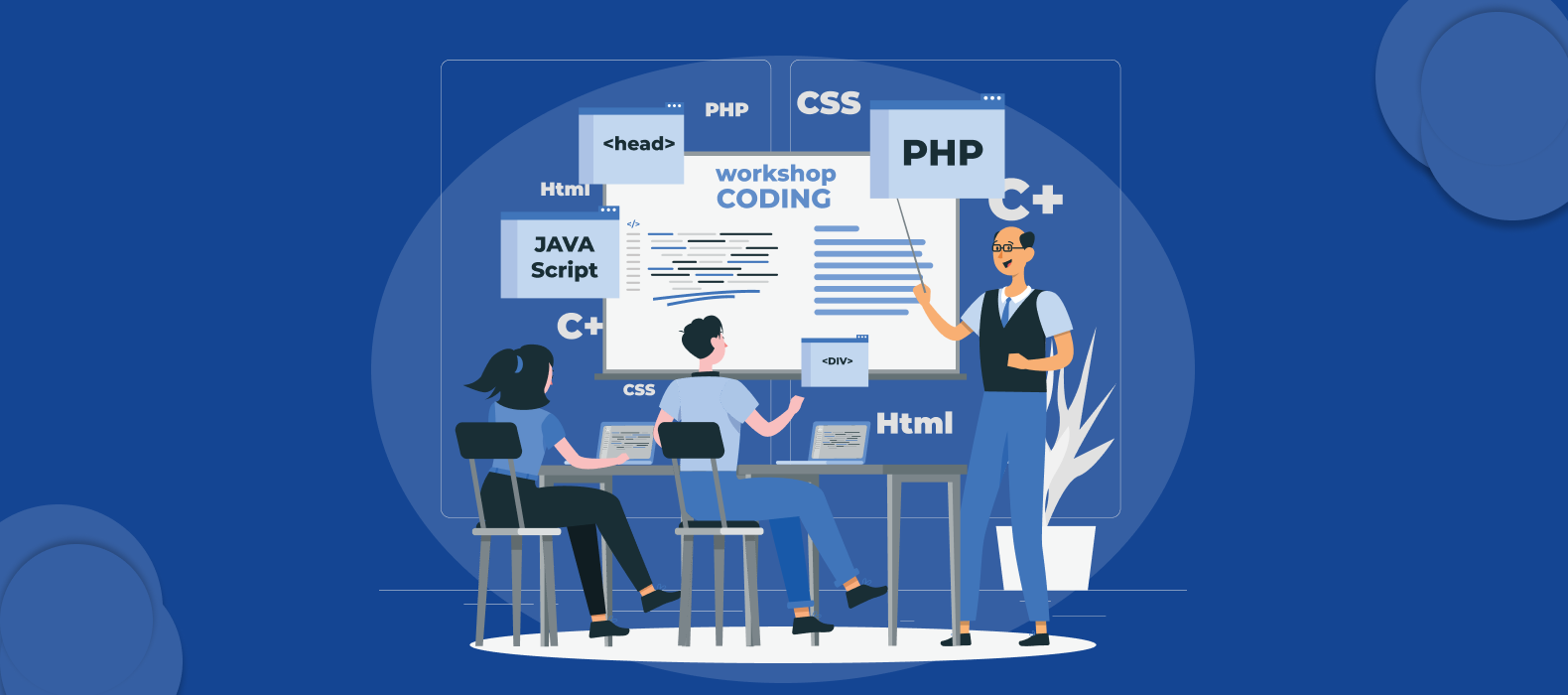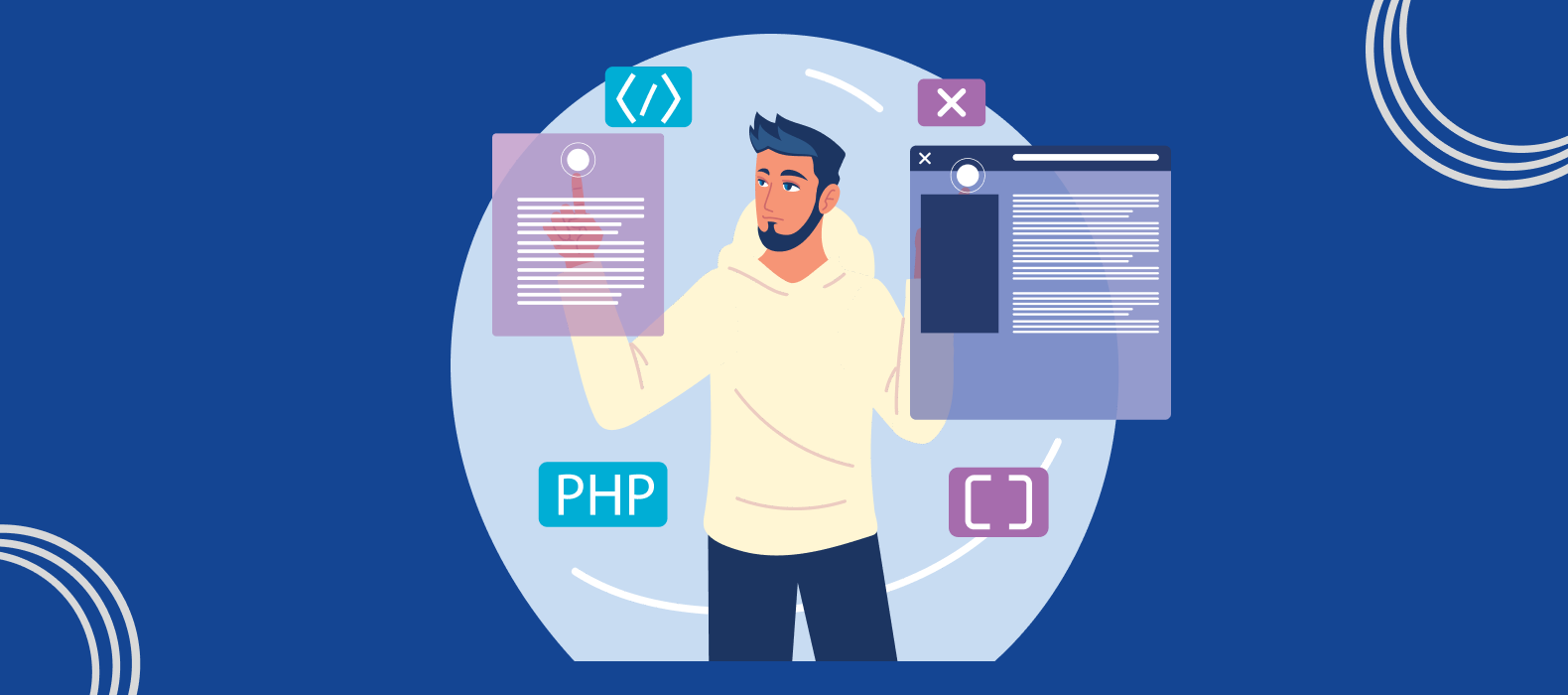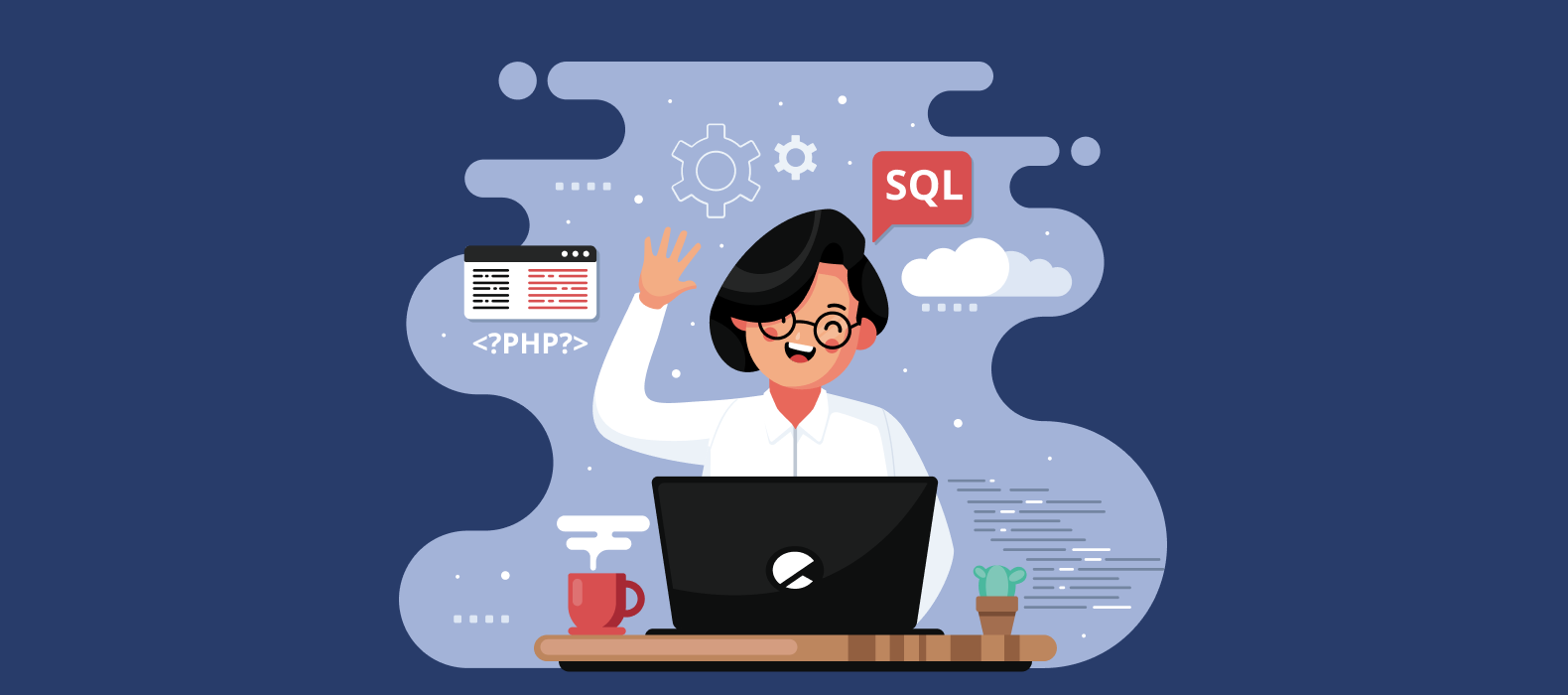Today, all websites use PHP for their server-side applications. This programming language undoubtedly has a fair number of supporters. However, there are also some detractors in the mix.
With the popularity of languages like Python growing, some programmers also highlight PHP’s shortcomings while building websites. Despite its many advantages, this scripting language has several drawbacks as well.
In this blog, we’ll examine the PHP for web development, why PHP is used for web development, and why you have to consider choosing it for your upcoming project.
What is PHP for Web Development?

PHP for web development is the term used to describe developing websites and web applications. PHP is a widely used server-side programming language for building dynamic websites, web applications, and e-commerce portals.
PHP is frequently utilized along with other web technologies like HTML, CSS, JavaScript, and MySQL databases. It offers web developers a variety of tools and frameworks that enable them to swiftly and effectively build complex online applications.
PHP is an open-source programming language, meaning anybody may use, change, and share its source code without restriction. This makes PHP popular for web developers who wish to swiftly and affordably create websites and web apps.
Laravel, Symfony, CodeIgniter, and CakePHP are well-known PHP frameworks used in web development. These frameworks give developers a selection of tools and libraries that facilitate the development of PHP web applications.
Though, without a doubt, PHP for web development is useful, it has several flaws that keep it from dominating that industry. Let’s examine some of the advantages and disadvantages.
|
Advantages |
Disadvantages |
| It makes simple code management easier. | It is not particularly secure because it is open-source and the ASCII text file is regularly viewed. |
| It is more dependable for a few years with the assistance of maintaining support for various versions. | PHP should not be used in web applications with vast amounts of content because it is not supported. |
| Various function modules can be used for data representation due to solid library support. | Users might get false information because of its flaws. |
| Due to PHP’s popularity, various developer communities have emerged, some of which may be candidates for employment. | PHP frameworks must become proficient in using built-in PHP features to reduce or eliminate the need for additional code. |
| PHP’s open-source and cost-free attributes are by far its greatest advantages. | With PHP, there is no room or way to modify or change essential behavior online. |
Why use PHP for Web Development?

PHP encourages developers to use rapid application development (RAD), which enables them to produce stable solutions as quickly as possible while saving time, avoiding code repetition, and reducing errors. Without PHP, developers must manually set up each database connection, resulting in repetitive code. PHP is a popular platform for creating websites for several reasons:
- Simple to Learn: Particularly for developers with prior experience in programming languages like C, Java, or Perl, PHP is a reasonably simple language to learn.
- Open Source: As an open-source language, PHP is available for use, modification, and distribution at no cost.
- Cross-Platform: PHP for web development is a flexible language because it can run on many different operating systems, including Windows, Linux, and macOS.
- Scalability: PHP may be used to create both small- and large-scale applications because it is very scalable.
- Speed: PHP is a fantastic option for creating web apps that need to function well because it is known for its quick execution speed.
- Large Community: As there is a sizable and vibrant community of PHP developers, there is a tonne of tools and frameworks at your disposal to support the creation of your apps.
- Integration: PHP is a flexible language for web development because it can be readily combined with other technologies like databases, web servers, and HTML.
How is PHP Used in Web Development?

PHP (Hypertext Preprocessor) is a popular server-side programming language made primarily for web development. This open-source programming language enables programmers to quickly create dynamic and interactive web applications.
PHP for web development is frequently combined with a web server like Apache or Nginx to produce dynamic web pages responding to user requests. To dynamically generate content and interact with databases, files, and other server-side resources, the language enables developers to directly integrate PHP code into HTML code.
In web development, PHP is frequently used in the following ways:
-
Developing dynamic web pages:
PHP for web development enables programmers to modify dynamic web pages based on user input. This enables the development of dynamic, captivating, and real-time responsive online apps.
-
Handling forms:
To manage form submissions on web pages, PHP web development is frequently used. When a user submits a form, data is delivered to the server so that PHP may process, validate, and save the information in a database.
-
Interacting with databases:
It is simple to read and write data to a database due to PHP’s built-in support for database interaction. Web applications that can store and retrieve information, such as user accounts, blog entries, and product listings, may be contractual to this.
-
Creating content management systems (CMS):
WordPress and Drupal are two examples of content management systems that utilize PHP. These PHP for web development tools make adding, editing, and publishing material simple for website owners.
-
Building e-commerce websites:
To manage product listings, shopping carts, and payment processing, e-commerce websites frequently employ PHP for web development.
PHP for web development is frequently use because of strong and adaptable language. It is a well-liked option for creating dynamic and interactive online applications due to its simplicity, adaptability, and broad community support. Developers use PHP IDEs to create, compile, run, and debug PHP code. Here is the procedure in detail:
Step 1: The client launches the browser and makes a webpage request.
Step 2: The server (where PHP is installed) searches for the relevant .php file.
Step 3: The PHP interpreter receives the file after it has been located and searches the database for the required information.
Step 4: The interpreter returns an HTML website as the desired data output.
Step 5: The HTML file is sent to the web server.
Step 6: The webpage is sent to the browser by the web server.
Benefits of using PHP in Web Development

1. Economical Choice:
Because PHP is open-source, most of its frameworks and libraries are free, lowering the cost of developing online applications and websites. The language is continually improved because of the vast international community that supports it.
2. Security:
It has built-in security protections that better shield websites from viruses, malware, and other typical security risks, so PHP for web development is regarded as one of the safest programming languages.
3. Performance:
PHP scripts run far faster than scripts written in other programming languages, resulting in faster loading times and improved response times for websites and web apps built using PHP. Moreover, it works on every platform and with any web browser, and it is simple to combine with other languages and various databases.
4. PHP for Web Development:
If you want to release a web application, this language is ideal because it can be integrated into HTML. Yet it can also be used for other things because it is a sophisticated and adaptable language.
5. Ease of Usage:
It’s hardly surprising that PHP is so well-liked among developers because the language is simple and well-structured. The command-line interface for PHP functions is simple for developers who programme in other languages. Hence, while the language is straightforward for a beginner, skilled programmers feel more at ease because of its many advanced capabilities because they can join the team in the middle of a project without getting lost.
6. Scalability and Flexibility:
PHP is incredibly flexible and scalable, enabling programmers to create code for moderately sized and massively scalable web applications. Moreover, it is quite extensible, enabling web application developers to quickly include new features and functionalities.
7. Strong Frameworks and a Big Community:
Due to the sizable developer and user base for PHP, there is a tonne of learning and troubleshooting resources online. In addition, PHP includes several strong frameworks like Laravel, CodeIgniter, and Symfony that give developers a set of tools and capabilities to help in the faster development of sophisticated online applications.
How much does PHP Development Cost?

The cost of PHP for web development can vary significantly based on several variables, including the project’s complexity, the size of the development team, the developers’ backgrounds and locations, and the project’s timeline.
The price for a straightforward PHP project might range from $30 to $40. The price can range from $60 to $70 for a more complicated project requiring a bigger development team and more time.
Also, the hourly pay for PHP developers can change based on location and experience. For instance, a PHP developer in the US or Europe can bill $100 or more per hour.
We’ve produced a table based on national averages to show how much a PHP developer costs:
| Geographical Regions | Rates |
| United States | $60-80/hour |
| United Kingdom | £400/day |
| India | $30-40/hour |
Examples Of PHP Websites
Applications, eCommerce platforms, and dynamic and interactive web pages can all be created with PHP. PHP is perfectly suited for a variety of web jobs, from creating dynamic web pages, sending emails, gathering web forms, and receiving cookies. PHP is a solid foundation for developing web applications such as content management systems (CMS), bespoke online databases, eCommerce websites, gaming applications, and community portals since it can save, delete, and edit information in a database.
PHP offers unmatched development potential when it comes to delivering a complete digital experience that improves the brand-customer interaction and boosts your competitive edge.
Let’s look at some real-world PHP examples:
1. Facebook:
Facebook utilizes a customized version of PHP called HipHop Virtual Machine (HHVM), which has led to improvements trickling down into PHP itself. The monthly active user base of Facebook is 2.45 billion. Speak of scaling!
2. Wikipedia:
Nothing receives greater activity in terms of changes than Wikipedia. Wikipedia is created at a rate of 594 new entries and 1.9 modifications per second, and it is based on the reliability and scalability of, you guessed it, PHP!
3. Yahoo:
The Yahoo news portal and search engine migrated to PHP in 2002 from a closed-source C/C++ system to cut expenses and allow growth. Almost 700 million individuals continue to use Yahoo services each month.
4. Canva:
Canva has experienced explosive development in recent years, offering a simple photo editor with templates for making graphics for the web or print. 10 million individuals in 179 nations presently use the well-known design platform.
5. Mailchimp:
With over 12 million users served and a PHP infrastructure, Mailchimp controls 60.51% of the global email market.
PHP vs. Other Programming Language

Several things we’ve mentioned here might also be used with other programming languages. Here are a few of the most popular PHP for web development alternatives to help you decide which is ideal for your project or business.
JavaScript:
As it has been around for almost as long as PHP, JavaScript continues to be the most widely used programming language. JavaScript is largely a client-side language. Therefore it cannot be directly compared to PHP. Nevertheless, with the emergence of Node.js and other frameworks, JavaScript developers can now create server-side scripts. Both languages are popular and adaptable, but only JavaScript supports full-stack development. Yet, because PHP is simpler to understand and maintain, using it might result in lower development expenses.
Python:
Python is one of the most widely used languages, and people adore it for its ease of use and adaptability. It has become the top choice for data science and AI but is still significantly less popular than PHP for web development. Although it is flexible and has a rapidly expanding community, Python does not offer the same database connectivity and support as PHP.
The language you select will ultimately depend on the project you’re working on and the features you want to emphasize.
Will you be Using PHP for Your Upcoming Web Development Project?
The popularity of the PHP language made it appropriate for any IT project. Therefore you can create commercial projects or big marketplaces in addition to feature-rich websites and online apps.
You can select an operating system and web server when using PHP for web development. It might replace your preferred language if you combine it with simplicity, rapid development, and good performance.
FAQs
Question 1: How does PHP interact with HTML?
PHP may be inserted in HTML code and was designed to operate with HTML. HTML tags are not found in pure PHP files. Web browsers receive the results in HTML once the server understands the PHP code.
Question 2: Is PHP a backend or a front end?
One of the scripting languages used on the backend is PHP. The server parses the PHP code when a PHP page is requested; in most situations, the result is dynamic HTML.
Question 3: What makes PHP a “scripting language”?
Because PHP for web development needs a server to run its code, it is a server-side language. The PHP code is run on the server, and the browser receives the run results. Because of this, PHP is also known as a scripting language and a server-side language.
Question 4: What are PHP’s benefits for business?
The two main benefits of adopting PHP for business are that it is cost-free (you only have to pay developer expenses) and incredibly scalable. A further benefit is that PHP programmers charge less than programmers of other scripting languages.
Question5: Will PHP make it easier to enter the market earlier than other languages?
One of the swiftest scripting languages is PHP. Indeed, PHP will help you enter the market faster than any other language if you want a website that loads rapidly (and gets you recognised by your consumers and market sooner).




